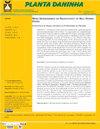Effects of light-dependent herbicides on growth and physiology of Salvia officinalis
IF 0.8
Q3 Agricultural and Biological Sciences
引用次数: 3
Abstract
Background: Salvia officinalis a medicinal plant which is severely affected by weeds competition. Objective: The objective of this study was to determine the growth and physiological responses of S. officinalis to some light-dependent herbicides. Methods: A factorial experiment was conducted to determine the effects of oxadiargyl (T), bentazon (B), oxyfluorfen (O), metribuzin (M), phenmedipham+desmedipham (P) at 0.75 (1), 1 (2) and 1.25 (3) rates on growth and physiological parameters of S. officinalis. Results: All herbicides initially caused visual injury to S. officinalis. SPAD values were decreased by all herbicide treatments except for low rate of phenmedipham+desmedipham and oxadiargyl. The relative leaf water content (RLWC) decreased following herbicide treatments except in P1, P2, B1, and B2. Membrane stability index decreased by herbicide treatments however there were no differences among control and P1, P2, B1, B2, O1, O3, M3, T1, T2, and T3. All rates of oxyfluorfen and oxadiargyl, P1, B1 and B2 had no marked effect on the maximum quantum efficiency of PSII (Fv/Fm). Plant growth was not affected by herbicide treatments probably due to the recovery of the plants at the end of the experiment excepting for metribuzin. Essential oil content increased as the herbicide rate increased based on herbicide type. Conclusions: The results showed that S. officinalis had the ability to recover over time depending on the herbicide type and rate. Results showed that phenmedipham+desmedipham and bentazon are suitable and metribuzin unsuitable herbicides for weeds selective control in S. officinalis.光效除草剂对鼠尾草生长和生理的影响
背景:鼠尾草是一种受杂草竞争影响严重的药用植物。目的:研究几种光敏除草剂对山茱萸生长和生理的影响。方法:采用因子试验方法,测定氧氟醚(O)、苯达松(B)、甲曲霉嗪(M)、苯美啶+地美啶(P)在0.75(1)、1(2)和1.25(3)浓度下对马蹄草生长和生理参数的影响。结果:所有除草剂均在初始阶段对马蹄草造成视觉损伤。除苯甲苯胺+地甲苯胺和恶二甲酰的比例较低外,所有除草剂处理均降低了SPAD值。除P1、P2、B1和B2外,各除草剂处理的相对叶片含水量均有所降低。除草剂处理降低了油菜的膜稳定性指数,但对照与P1、P2、B1、B2、O1、O3、M3、T1、T2和T3之间无显著差异。甲氧氟醚、恶二甲酰、P1、B1和B2对PSII的最大量子效率(Fv/Fm)无显著影响。除草剂处理对植株生长没有影响,可能是由于除甲曲霉嗪外,植株在试验结束时恢复正常。不同除草剂类型,精油含量随除草剂用量的增加而增加。结论:结果表明,不同除草剂类型和施用量的马蹄草具有随时间恢复的能力。结果表明,苯甲胺磷+地苯甲胺磷和苯达松是有效的除草剂,而甲曲霉嗪是不合适的除草剂。
本文章由计算机程序翻译,如有差异,请以英文原文为准。
求助全文
约1分钟内获得全文
求助全文
来源期刊

Planta Daninha
Agricultural and Biological Sciences-Plant Science
自引率
0.00%
发文量
0
审稿时长
16 weeks
期刊介绍:
Planta Daninha is a scientific journal published by the Brazilian Society of Weed Science (SBCPD - Sociedade Brasileira da Ciência das Plantas Daninhas). Papers submitted for publication must be sent through an electronic system, on http://www.scielo.br/pd. Works may be written in Portuguese, English, or Spanish, and will be accepted after being reviewed and approved by the Editorial Board. Only papers that have not been published or submitted for publication in other media will be accepted. Articles in Portuguese will be translated to English after being properly corrected and authorized by the authors. Planta Daninha has with goal to publish genuine technical-scientific papers and literature reviews from a critical perspective on Biology, weed management, and related topics.
 求助内容:
求助内容: 应助结果提醒方式:
应助结果提醒方式:


